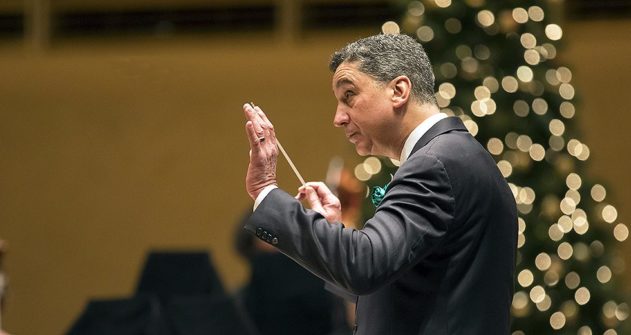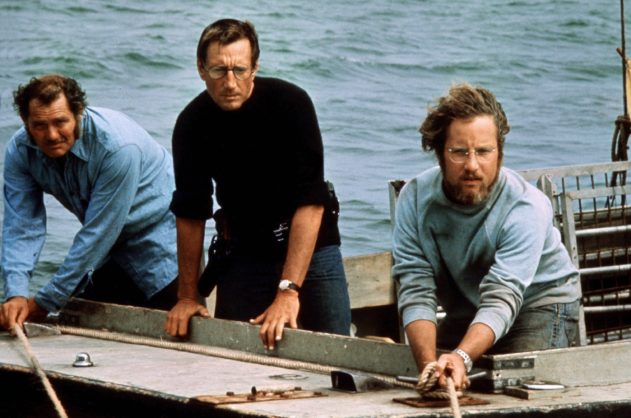TONIGHT IN WASHINGTON: “Jaws” to be shown at Wolf Trap while the National Symphony Orchestra plays score live
One of soundtrack composer John Williams’s great masterstrokes with the Steven Spielberg-directed “Jaws” (1975) was crafting a musical theme with just two notes, E and F. Recognizable the world over, that half-step interval instantly causes tension knowing that the monster great white shark is nearby.
In fact, it’s arguably the first thoroughly-modern score, said Emil de Cou, who will conduct the National Symphony Orchestra in playing the “Jaws” score at the Wolf Trap in Vienna, Virginia, on Saturday as the film rolls on a huge screen above—creating a simultaneous concert and film viewing for 3,000 people at the outdoor venue.
“That’s really the first minimalist score. You never had a theme of two notes for anything in movie history [before], which was actually kind of brave,” de Cou said of Williams’s instantly-identifiable interval, adding that at first director Steven Spielberg assumed Williams was joking with such a Spartan monster theme.
“It’s really there to be the theme for this thing that you don’t see,” de Cou said. “But also it came in handy because they had trouble with the mechanical shark.”
Find out more about this event
Indeed, the problems encountered on the troubled set of “Jaws” were legion, not least of which was the mechanical shark being notoriously uncooperative in the salty waters off of Martha’s Vineyard after having been tested in a freshwater tank in California. Williams’s theme stood in for the absent special effect, and even forty-three years after “Jaws” became the first-ever summer blockbuster, his musical motif continues to elicit most of the film’s terror.
De Cou says that in all of film history, only “Jaws” and Bernard Hermann’s sawing “shower scene” cue from “Psycho” can be so recognized with so few notes.
“I expect half the audience to sort of burst out into laughter together … when they hear ‘dun dun,’” he said of the ominous E and F signifying the shark’s presence. “It’s been spoofed so many times, but it’s really a testament to the brilliance of the score.”
Like the monster shark that preys on peaceful Amity Island, de Cou too is a product of Hollywood. He recalls rummaging through the garbage bins of what he called a “C-studio” near his grandparents’ home in search of strips of tossed-out celluloid, to then view by flashlight.
“I was always fascinated with films. But then classical music and conducting came later,” he said.
Indeed, in addition to having been associate conductor of the NSO since 2003, de Cou continues to rack up frequent flyer miles leading various other ensembles throughout the United States. Continuing his summer of Williams, he will next conduct the Chicago Symphony Orchestra on August 2nd, in a performance of the score for “Raiders of the Lost Ark,” again, while the film is playing.
De Cou is grateful for this unique marriage of music and movie, a relatively new art form, according to him, and one that wasn’t even practiced a decade ago.
“It’s given a whole new life to orchestral music as summer music especially,” he said. “People buy tickers to see ‘Raiders’ or ‘Jurassic World,’ and they don’t realize they’re going to hear a one-hundred piece orchestra play for three solid hours.”
The irony here, of course, is that the score for “Jaws” is barely forty minutes long (the film runs just over two hours in total). In subsequent interviews about the film, both Spielberg and Williams were adamant that the music should never be a red herring, i.e., the music only plays when the shark is actually there. Ergo, there is no music at all during the lengthy scene in which a pair of boys in snorkels prank Amity’s Fourth of July beachgoers with nothing but a cardboard fin. However, just after their ruse is revealed, the real shark swims into the estuary, and the orchestra returns.
“I was talking to Michael Giacchino, and he said everything is underscored now,” de Cou said of the prolific composer of the rebooted “Star Trek” franchise as well as “Rogue One.” “He likes the old-fashioned [scores] where you have silences, and then the music comes in and means something” (SEE ALSO, Michael Giacchino being interviewed by Den of Geeks)
De Cou said Giacchino—who, like de Cou, also initially fell in love with film before switching to music—will often placate producers who want even false scares to be underlined by offering just a minimal cue for piano and strings.
By bringing in the music only when it counts, de Cou said Williams in effect made the “Jaws” theme its own character in the film.
“It’s not just wallpaper,” de Cou said. “From a theatrical standpoint [and] a composer’s standpoint, there’s nothing that raises the tension more than just silence.”
De Cou was fortunate to meet Williams during his own early tenure with the National Symphony Orchestra. Williams came into Washington, D.C., for a program of his film scores, during which de Cou said the professional musicians of the ensemble “became five years-old again” when meeting the multiple Oscar winner.
“Besides being one of the greatest American composers in history, he’s actually one the sweetest, nicest, kindest people you’d ever meet,” de Cou said of Williams, who nabbed yet another Oscar nod this year for “Star Wars: The Last Jedi.”
“You’ve taken this music into your heart, and it’s kind of like our modern-day fables and fairy tales. This is what we send out to the world; it’s our contribution to world culture,” de Cou said of the output by Williams, who is 86 and still working. “And then you meet the man who wrote them, and he’s like the sweetest grandpa in the world.”
Saturday’s performance as the Wolf Trap will feature a pre-concert lecture from marine biologists and other shark experts from the nearby Smithsonian, seeking to debunk the sharks-as-mindless-killers myth that were ensconced in the popular imagination by the likes of “Jaws” and this summer’s upcoming “The Meg.”
“Sharks have become kind of vilified when they’re just animals. They’re not mean,” de Cou said, adding that the monster at the center of “Jaws” is a grand fiction, however enjoyable and scary.
The weather calls for some rain Saturday evening, but de Cou encourages capital-area music and movie lovers to brave the potential summer showers to join the NSO under the Wolf Trap’s roof. If anything, the conductor said, the rain will add to the “wet” nature of the beach-based film.
“It’s a great way to introduce a new audience to the music by the greatest American composer,” he said. “I know this orchestra so well, and they’re just going to be having as much fun as anybody. Especially the cellos and basses going ‘dun dun,’” he said with a raucous laugh. “We’re going to have so much fun.”
Washington, D.C.-based Eric Althoff is special to Screen Comment (MuckRack profile)
news via inbox
Nulla turp dis cursus. Integer liberos euismod pretium faucibua





